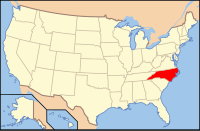Orange County, North Carolina
| Orange County, North Carolina | ||
|---|---|---|

Orange County Courthouse
|
||
|
||
 Location in the U.S. state of North Carolina |
||
 North Carolina's location in the U.S. |
||
| Founded | 1752 | |
| Named for | William V of Orange | |
| Seat | Hillsborough | |
| Largest town | Chapel Hill | |
| Area | ||
| • Total | 401 sq mi (1,039 km2) | |
| • Land | 398 sq mi (1,031 km2) | |
| • Water | 3.5 sq mi (9 km2), 0.9% | |
| Population | ||
| • (2010) | 133,801 | |
| • Density | 336/sq mi (130/km²) | |
| Congressional districts | 4th, 6th | |
| Time zone | Eastern: UTC-5/-4 | |
| Website | orangecountync |
|
Orange County is a county located in the U.S. state of North Carolina. As of the 2010 census, the population was 133,801. Its county seat is Hillsborough.
Orange County is included in the Durham–Chapel Hill, NC Metropolitan Statistical Area, which is also included in the Raleigh–Durham–Chapel Hill, NC Combined Statistical Area, which had a 2012 estimated population of 1,998,808.
It is home to the University of North Carolina at Chapel Hill, an institution of the University of North Carolina System and the oldest state-supported university in the United States.
The county was formed in 1752 from parts of Bladen County, Granville County, and Johnston County. It was named for the infant William V of Orange, whose mother Anne, daughter of King George II of Great Britain, was then regent of the Dutch Republic.
In 1771, Orange County was greatly reduced in area. The western part of it was combined with the eastern part of Rowan County to form Guilford County. Another part was combined with parts of Cumberland County and Johnston County to form Wake County. The southern part of what remained became Chatham County.
...
Wikipedia

